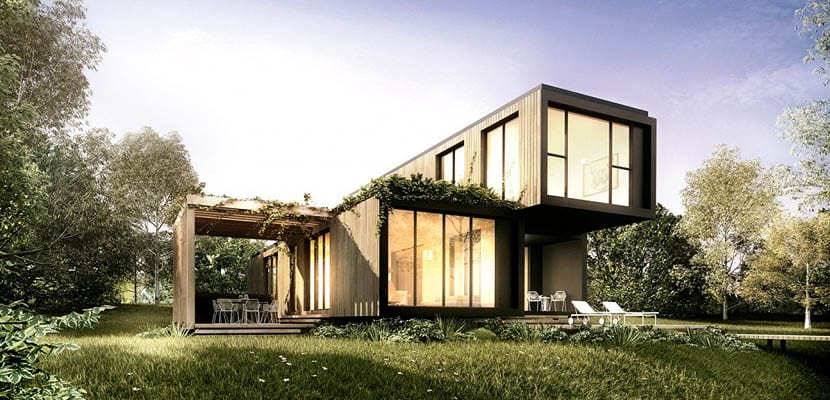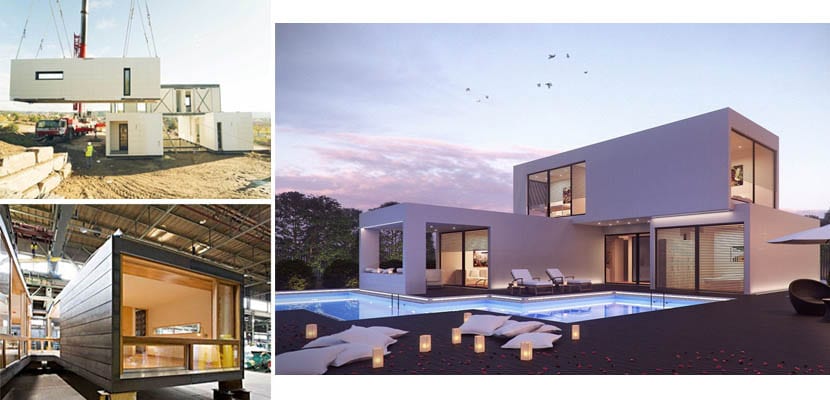
You design your home, order it, build it and take it to the land chosen to live. Modular houses They have gained popularity in the last decade, do you want to know why? In Decoora We discover the advantages and disadvantages of this new form of construction that shortens deadlines and offers competitive prices.
What is a modular home?
A modular house is a house in which the construction process has been industrialized. This process consists of the assembly of different components in a factory shaping portable modules which will later be transported and finished off in their final location.
From these modules, different efficient building configurations in shorter terms than conventional construction. And at more competitive prices. However, contrary to what many may think, they require, just like these, a technical project and a building license.

Advantages of modular homes
El standardized process of modular homes makes it possible to shorten deadlines compared to conventional construction. This is undoubtedly one of the biggest advantages of buying a modular home, but not the only one. Beyond the speed, the price and the minimum work that must be carried out have also influenced its popularity.
- Faster: Most of the work is carried out in a factory, under constant lighting, humidity and temperature conditions. By not influencing the meteorological phenomena, as would happen in an exterior construction, everything is done faster.
- Minimum work: Only a small work on the ground is necessary: the foundation. This is generally done with a solid concrete slab, or continuous beams, so that the modules support in a totally uniform way. The connections of the water, electricity and sanitation services are also made on the ground, as well as the joining ends of the modules.
- Most competitive price: The companies integrate project and work, which allows optimization of deadlines, finishes and standardization of construction solutions. Standardization and optimized study avoid surprises on site or cost overruns for the client.
- Custom interiors: Each home is customizable and exclusive in terms of finishing materials, floors, paint, tiling, etc ...

Disadvantages of modular homes
All are not advantages in modular homes. The industrialized and standardized process established to achieve greater efficiency, makes us have to choose between preset models. These are less flexible in shape than a conventional house. Is that a problem for you?
- Little flexible. Modular homes are not very flexible in terms of shapes. They flee, generally from the capricious forms that may require certain sites due to their orientation or trees.
- Not all terrains They are suitable. It is essential to study the plot urbanistically, see what the conditions are established and with these premises, analyze what a modular home would be like in that place with that environment and with those circumstances.
- Transport. The house is transported from the factory to the destination with heavy duty cranes. Cranes that must be able to reach the ground without problems.
- The price of customizations. The construction process and the standardization of pre-established models allow the price of modular houses to be competitive. If we want to carry out too many changes, it may not be profitable.
Purchasing process
Modular homes need a technical project and a building license. While the license is obtained, the execution and manufacturing project is carried out. And once the municipal license is obtained? So yes, the manufacture of the house will start. These are roughly the steps in the process of buying a modular home.

Do you want to know the process in greater detail? INHAUS, one of the modular housing companies whose website we have consulted gives us more details about the purchase process. An already standardized and regulated purchasing process, in which the following 6 steps must be followed:
- Choose the layout of the house. Among the many preset designs, choose the one that best suits your needs. Then you can personalize your new home with hundreds of combinations of finishes and accessories to adapt it to your family's lifestyle.
- Feasibility study. Once you have the model of your house already selected and your personalized budget, the company will be in charge of ensuring the suitability of the house for the plot and carrying out the rest of the pertinent procedures. For your peace of mind, they will be the ones who will centralize all the procedures so that you do not have to worry about anything else.
- Formalization of the purchase. With the feasibility study in hand, it is time to sign and formalize the purchase contract. This contract confirms the qualities and accessories established, the delivery date and the final price updated and defined according to the exclusive customizations of each user.
- Personalization: This section includes the adaptation of forms and functions, the choice of finishes for rooms, the customization of metal and wood carpentry for cabinets, kitchens, etc. Also the verification of the electrical installation, the configuration of the accessories ...
- Management, procedures and work. Some companies like InHAUS take care of everything so you don't have to worry about a thing. They are in charge of presenting the basic and execution project at the official college for its corresponding visa and making the subsequent application for a license to the town hall. The geotechnical test, the formalization of insurance contracts, the notification to the relevant technical control bodies, quality control, etc.
- Key collection. Once the work is finished, once the corresponding external certifier carries out an exhaustive inspection together with the client's approval, the keys will be handed over.
Are you now more clear about what a modular home is and what it implies?
They could incorporate the date of completion of this article.